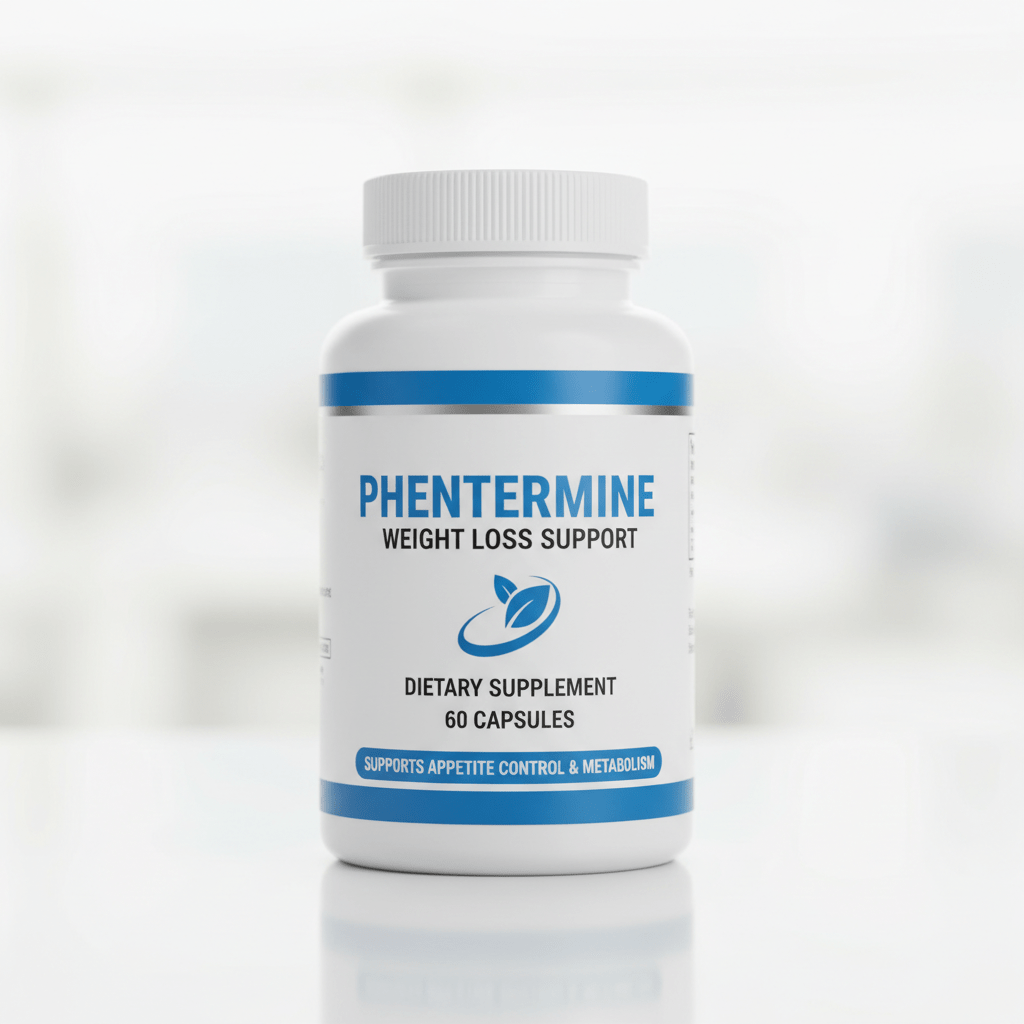Phentermine™ Prescription Medication For Weight Loss

Phentermine is a prescription medication used to help with weight loss by suppressing appetite. It works as a stimulant, similar to an amphetamine, affecting the central nervous system to reduce hunger and increase energy levels.
Typically prescribed for people who are obese or have weight-related health issues, Phentermine is most effective when combined with a healthy diet, regular exercise, and lifestyle changes.
Today Only: $39 Bottle
Phentermine™ Customer Reviews

“I went to the doctor today and I’ve lost 23 lbs in 4 weeks. I recommend this to anyone struggling with weight loss. It helps me stay full. … The only side effect I’ve had was dry mouth the first week.”

“Three months ago, my physician prescribed Phentermine HCL 30 mg capsules to assist me with weight loss. At 5’2″ tall, I weighed 206 pounds when I began treatment. After three months, I’ve lost weight, going from a size 18 to a size 14, and now weigh 179 pounds. … The only side effects I’ve experienced are dry mouth, easily managed by increased water intake, and initial insomnia, which has since resolved.”

“Three months ago, my physician prescribed Phentermine HCL 30 mg capsules to assist me with weight loss. At 5’2″ tall, I weighed 206 pounds when I began treatment. After three months, I’ve lost weight, going from a size 18 to a size 14, and now weigh 179 pounds. … The only side effects I’ve experienced are dry mouth, easily managed by increased water intake, and initial insomnia, which has since resolved.”
Why Choose Phentermine™

Made In USA
Our Product 100% natural supplement is proudly made in the United States of America.

FDA Approved
It is formulated in a facility registered with FDA & follows all FDA regulations.

GMP Certified
Good Manufacturing Practice certified ensuring pharmaceutical grade quality.

All Natural
We are proud to offer Phentermine, made with all-natural, non-GMO and gluten-free ingredients.

Free Delivery
Free delivery service and enjoy a hassle-free shopping experience.


What Is Phentermine™ Weight Loss Drug?
Phentermine is a prescription drug that helps people lose weight by controlling their appetite. It is specifically designed for people who have difficulty losing weight through diet and exercise alone. This drug stimulates the brain’s nervous system, which reduces appetite and reduces daily calorie intake.
This drug is usually used as a short-term treatment for people who are overweight (obese) or have weight-related health problems, particularly in the context of proper drug administration for those with an initial body mass index. Doctors prescribe it when lifestyle changes alone (such as a healthy diet and regular exercise) are not enough to lose weight.
Although phentermine is effective, it is not a long-term solution. Doctors usually recommend it for a short period (a few weeks to a few months). This is because long-term use may reduce its effectiveness and increase the risk of side effects.
Additionally, if you experience any negative reactions, contact a poison control center or seek medical help immediately, as phentermine can interact with other medications or supplements, which may increase the risk of adverse reactions or affect how well phentermine works.
For example, combining phentermine with certain antidepressants, blood pressure medications, or supplements like St. John’s Wort can enhance side effects such as increased blood pressure, heart rate, or nervousness. It is important to inform your doctor about all medications and supplements you are taking before starting phentermine.
Phentermine should never be used as a stand-alone treatment. It should be part of a comprehensive weight loss plan. Which will include:
Nutritious and moderate diet. Regular physical activity. Lifestyle modification (such as adequate sleep and stress management). The drug only works well when combined with healthy habits.
Phentermine has some potential side effects, including headache, insomnia, dry mouth, and increased heart rate. It is not suitable for pregnant women, people with heart disease, or patients with certain health problems. Therefore, it should never be used without consulting a doctor.
Phentermine is a weight loss aid, but it is not a magic pill. Its success depends on the user making positive changes in their lifestyle. Therefore, using it correctly, following the doctor’s instructions, can make the weight loss journey easier. It is important to note that phentermine may interact with other medications or supplements you are taking, which could affect its effectiveness or increase the risk of side effects.
Certain medications, such as antidepressants, blood pressure drugs, or other weight loss products, may have dangerous interactions with phentermine. Supplements can also contribute to unexpected side effects. Always inform your healthcare provider about all medications and supplements before starting phentermine for weight loss.
How Does Phentermine™ Work
Phentermine is a central nervous system (CNS) stimulant that works by changing chemical signals in the brain to control appetite. It is an amphetamine-like drug, but it is not as strong as amphetamine. Here is a detailed discussion of how it works and how it helps with weight loss:
1. How does phentermine work in the brain?
Phentermine works by changing the levels of chemical messengers called neurotransmitters.
Noradrenaline: It increases the brain’s “fight or flight” response, which helps reduce appetite.
Dopamine: It controls reward and pleasure, reducing food cravings.
Serotonin: It plays a role in mood and appetite control.
By increasing the levels of these neurotransmitters, phentermine sends the brain a signal that your appetite has decreased, so you eat less than usual and consume fewer calories.
2. Physical Effects: Increased Energy and Metabolism. Phentermine not only reduces appetite, but it also has the following effects on the body: Increases heart rate and blood pressure, and activates the sympathetic nervous system. As a result, you feel refreshed and energized. This may cause some users to exercise more, which helps burn calories.
3. Helps with diet and lifestyle changes: The biggest benefit of phentermine is that it helps users develop healthy habits. Reduced hunger makes it easier to choose smaller portions and nutritious foods. Increased energy increases motivation to exercise. Rapid initial weight loss (within 1-2 weeks) increases users’ confidence, which encourages long-term change.
4. Improves insulin sensitivity (metabolic benefits): Insulin resistance is a common problem in obese individuals. Phentermine indirectly helps to stabilize blood sugar levels. Reduced glucose spikes due to low carbohydrate intake. Reduced risk of metabolic syndrome by reducing fat storage.
Increases metabolic rate. Some studies have shown that phentermine can slightly increase the basal metabolic rate (BMR), meaning the body burns more calories. However, these effects are temporary, and their effectiveness may decrease in the long term.
Phentermine is a powerful drug that can help with weight loss by changing the metabolic processes in the brain and body. However, it is only an auxiliary ingredient. However, its success depends on the user’s diet, physical activity, and overall lifestyle. It is very important to follow the doctor’s instructions to avoid any side effects or health risks.
Phentermine™ Ingredients
Absolutely. Here’s a more detailed breakdown of phentermine, its active and inactive ingredients, formulations, and how it works.
🧪 Phentermine: Full Ingredient Overview
🔹 1. Active Ingredient
Phentermine Hydrochloride (HCl)
This is the primary component responsible for phentermine’s therapeutic effect. It is a central nervous system (CNS) stimulant that acts as an appetite suppressant. It stimulates the release of certain neurotransmitters (norepinephrine and dopamine) in the brain that signal a fight-or-flight response, which decreases hunger.
Phentermine HCl is typically found in dosages of:
8 mg (as in Lomaira) – low-dose, disintegrating tablet
15 mg, 30 mg, 37.5 mg – standard doses in tablet or capsule form
🔹 2. Inactive Ingredients (Excipients)
These are non-medicinal substances added to the formulation to help with:
Tablet or capsule structure
Absorption
Stability
Taste
Color
💊 In Tablets (e.g., Adipex-P, Lomaira):
Common inactive ingredients include:
Lactose monohydrate – sugar used as a filler
Microcrystalline cellulose – helps tablets hold their shape
Magnesium stearate – lubricant to prevent sticking during manufacturing
Corn starch – binder and disintegrant
Silicon dioxide – anti-caking agent
FD&C Blue No. 1 – dye
D&C Red No. 33 – dye (for colored tablets)
Aspartame or saccharin sodium – artificial sweeteners (in orally disintegrating tablets like Lomaira)
Crospovidone or sodium starch glycolate – helps the tablet break down in the digestive system
Colloidal silicon dioxide – flow agent
🟣 In Capsules (Generic or branded phentermine):
Gelatin – capsule shell
Titanium dioxide – gives capsules a white, opaque appearance
Dyes – such as FD&C Yellow No. 6, Blue No. 2, depending on the brand
Starch
Magnesium stearate
🔍 Different Forms of Phentermine
| Brand/Generic | Dosage | Form | Key Notes |
|---|---|---|---|
| Adipex-P | 37.5 mg | Tablet or capsule | Most commonly prescribed |
| Lomaira | 8 mg | Orally disintegrating tablet (ODT) | Taken 30 min before meals |
| Suprenza | 15, 30, 37.5 mg | ODT (discontinued in many areas) | Fast-acting, melts in mouth |
| Generic versions | 15–37.5 mg | Tablet or capsule | Varies by manufacturer; may have different dyes or fillers |
⚠️ Important Warnings
Not suitable for long-term use due to risk of dependence and cardiovascular side effects
Should not be combined with MAO inhibitors, certain antidepressants, or other stimulants
Inactive ingredients may trigger allergies (e.g., lactose intolerance, dye sensitivity, gelatin for vegetarians/vegans)
👩⚕️ Should You Worry About Inactive Ingredients?
You should check the label or patient insert for the exact list, especially if:
You have food allergies (e.g., lactose, corn)
You’re gluten-sensitive (though phentermine is usually gluten-free)
You’re avoiding artificial dyes or sweeteners
You have PKU (phenylketonuria) – watch for aspartame
If you tell me the specific brand and dosage you’re asking about, I can pull up the exact ingredients used in that formulation. Would you like that?
Phentermine™ Benefits?
Phentermine is a prescription drug. It is used to treat obesity and weight-related health conditions, including high cholesterol and other problems. It not only reduces weight but also provides some important metabolic and cardiovascular benefits. Below are its main health benefits in detail:
1. Helps in weight loss and fat loss: The primary and biggest benefit of Phentermine is that it effectively reduces weight. Helps in reducing an average of 5-10% of body weight in 3-6 months (according to studies). Reduces visceral fat (belly fat), which reduces the risk of diabetes and heart disease. Helps in long-term weight management when combined with diet and exercise.
2. Reduces the risk of type 2 diabetes: Phentermine improves insulin sensitivity and is beneficial for patients with pre-diabetes or metabolic syndrome. Helps in controlling blood sugar levels. Reduces the risk of type 2 diabetes by reducing insulin resistance. Some studies have shown that it helps reduce HbA1c (glycated hemoglobin) levels.
3. Improves cardiovascular health: Although phentermine temporarily increases heart rate and blood pressure, it has some positive effects on the heart in the long term. As weight loss occurs**, blood pressure, cholesterol, and triglyceride levels improve. Reduces the risk of atherosclerosis (hardening of the arteries). Helps reduce sleep apnea, which reduces stress on the heart.
4. Controls symptoms of metabolic syndrome: If you have metabolic syndrome (high blood pressure, high blood sugar, excess waist fat), phentermine helps in the following ways. Reduces triglycerides and LDL (bad cholesterol). Increases HDL (good cholesterol). May help reduce fatty liver disease (NAFLD).
5. Increases mental well-being and self-confidence: With weight loss, the following psychological improvements are seen in phentermine users. Helps reduce depression and anxiety (self-confidence increases due to weight loss). Increases physical activity**, which releases endorphins and keeps the mood good. Helps control emotional eating by reducing food cravings.
6. Reduces joint pain and knee-back pain: Many people experience pain in the knees, back, and joints due to excess weight. Losing weight with phentermine reduces pressure on the joints and reduces symptoms of osteoarthritis. Walking and exercising become easier, which increases muscle strength.
7. Positive effects on fertility and hormonal balance: Phentermine can help if women have PCOS (polycystic ovary syndrome). It reduces insulin resistance and regulates ovulation. May reduce hormonal imbalance** and increase fertility.
What to do to get the most benefit?
1. Take the dose as directed by your doctor (usually 15-37.5 mg/day).
2. Take in the morning to avoid sleep disruption at night.
3. Follow a low-carb, high-protein diet.
4. Do regular cardio and strength training.
5. Drink 3-4 liters of water a day to avoid dehydration.
Phentermine not only helps with weight loss, but also helps improve diabetes, heart disease, metabolic syndrome, and mental health. Remember that to get the benefits of phentermine, it must be combined with a healthy diet, exercise, and medical supervision. Relying on medication alone will not achieve long-term success.

Add Your Heading Text Here
Lorem ipsum dolor sit amet, consectetur adipiscing elit. Ut elit tellus, luctus nec ullamcorper mattis, pulvinar dapibus leo.
Lorem ipsum dolor sit amet, consectetur adipiscing elit. Ut elit tellus, luctus nec ullamcorper mattis, pulvinar dapibus leo.
What Happens When You Click The "Buy Now" Button?
Phentermine™ Frequently Asked Questions (FAQs)
Is Phentermine a Controlled Substance?
Yes, Phentermine is a controlled substance (Schedule IV). It is a stimulant drug that has a chemical structure similar to amphetamine and has a risk of addiction or abuse. In the United States, the Drug Enforcement Administration (DEA) has listed it as a Schedule IV drug, so it is available only with a doctor’s prescription.
What is phentermine-topiramate?
Phentermine-Topiramate is a combination medication used to treat obesity and weight management. It is usually prescribed in conjunction with a low-calorie diet and regular physical exercise. Phentermine HCI is a central nervous system stimulant that controls appetite and increases energy. It reduces food cravings by sending signals to the brain. This combination is available under the brand name Qsymia and should only be used with a doctor’s prescription.
How and when to take Phentermine correctly?
This is only for adults and adolescents aged 16 years and older (on the advice of a doctor). Only for obesity or weight-related problems prescribed by a doctor.
In the morning on an empty stomach (before breakfast) – the best time. Or in the first part of the day (before 12 noon), so as not to disturb sleep.
Phentermine is a stimulant drug, so it can cause insomnia. Taking it at night or in the evening may cause difficulty falling asleep.
Take it with a full glass of water. Do not chew or break it – swallow it whole. Strictly follow the amount and schedule prescribed by your doctor.
Avoid other stimulants (coffee, energy drinks) – may increase heart rate or blood pressure. Do not mix with alcohol – may cause dangerous side effects. Never increase the dose – may reduce the effectiveness of the drug and increase the risk.
How to take phentermine 37.5 for best results?
Usually once a day (37.5 mg tablet/capsule).
On an empty stomach (before breakfast) or 1-2 hours after breakfast. The medicine is absorbed quickly and effectively when taken on an empty stomach. Taking it after breakfast helps reduce stomach discomfort (nausea, vomiting, gastritis).
However, do not increase/decrease the dose without consulting a doctor. Swallow the tablet whole, do not chew or break it. Take it with plenty of water.
Avoid in the afternoon or at night – insomnia may occur (phentermine is a stimulant). Reduce caffeine/energy drinks can increase heart rate. Avoid alcohol can cause dangerous side effects.
How long can you take phentermine?
Standard guidelines (FDA approved) Short-term use up to 12 weeks (3 months) maximum. Because tolerance can develop with prolonged use, resulting in reduced effectiveness of the drug.
In some cases, doctors may prescribe phentermine for more than 3 months (if the patient’s condition and the rate of weight loss are satisfactory). However, this must be done under strict medical supervision. Regular monitoring of heart rate, blood pressure and side effects is essential.
There are several risks of long-term use. Potential for addiction or abuse (phentermine is a Schedule IV controlled substance). Increased risk of heart problems, insomnia, mental instability. Risk of weight regain (if lifestyle changes are not made).
What is the difference between phentermine capsules and tablets?
Yes, Phentermine is a controlled substance (Schedule IV). It is a stimulant drug that has a chemical What is the difference between phentermine capsules and tablets?
1. Active ingredient and efficacy
Both forms contain the same active ingredient: phentermine HCl.
There is no difference in weight loss results – both are equally effective.
2. Absorption Rate
Capsule Tablets
Rapidly absorbed – dissolves quickly in the stomach and enters the bloodstream. X Slowly absorbed – requires swelling and breaking down.
Complete absorption is guaranteed (capsule coating dissolves completely in the stomach). X Risk of incomplete
absorption – some tablets may pass out of the body unchanged.
3. Price and availability
Tablets are generally cheaper (lower production costs).structure similar to amphetamine and has a risk of addiction or abuse. In the United States, the Drug Enforcement Administration (DEA) has listed it as a Schedule IV drug, so it is available only with a doctor’s prescription.
3. Price and availability
Tablets are generally cheaper (lower production costs).
Capsules are relatively more expensive, but more effective in absorption.
4. Advantages and disadvantages
Form Advantages Disadvantages
Capsules Fast absorption
– Less stomach discomfort – Higher price
Tablets Cheap
Easily available – Delayed absorption
May cause stomach discomfort by swelling
5. Which one to choose?
For fast and effective absorption: choose capsules.
For cost-effectiveness: take tablets (but consult your doctor).
Important note
Use both forms only on doctor’s prescription.
Capsules are a good option if you have sensitive stomach.
Never chew or break the medicine swallow it whole.
Choose the form that is right for you according to your doctor’s advice!
10 main reasons for not losing weight despite taking phentermine
1. Eating habits mistakes (excess or insufficient calories)
Overeating: Even though phentermine reduces appetite, eating high-calorie foods (junk food, sweets) will not lead to weight loss.
Undereating: If calorie intake is too low (below 1200 calories), the body goes into starvation mode, resulting in slow metabolism and weight loss.
2. Lack of sleep (sleep deprivation)
Sleeping less than 6-8 hours increases the cortisol hormone, which is oriented towards fat storage.
Although the stimulant effect of phentermine increases insomnia, it has a negative effect on weight loss.
3. Underlying health problems
PCOS (polycystic ovary syndrome): Insulin resistance prevents weight loss.
Hypothyroidism: Lack of thyroid hormone slows metabolism.
Prediabetes/Diabetes: Uncontrolled blood sugar levels reduce fat burning.4. Nutritional deficiencies (vitamin/mineral deficiencies) Deficiency of vitamin D, magnesium, iron weakens metabolism.
Protein deficiency reduces muscle loss and metabolic rate.
5. Stress (chronic stress)
High cortisol levels help accumulate belly fat (visceral fat).
Stress increases emotional eating, which neutralizes the effects of phentermine
6. Physical inactivity (lack of exercise)
Although phentermine increases energy, losing weight by eating less alone is not sustainable.
Metabolism does not boost unless you do a combination of cardio + strength training.
7. Dehydration
Not drinking enough water slows down the body’s fat burning process.
Metabolism can decrease by 2-3% due to lack of water.
8. Tolerance to Phentermine
If used for more than 12 weeks, the body adjusts to the effects of the drug, resulting in reduced effectiveness.
Solution: Telk to your doctor and stop the drug end take a break for 1-2 months.
9. Wrong dosage or irregular consumption
If you do not follow the dosage prescribed by the doctor (such as missed doses), the results will be delayed.
If you do not take it on an empty stomach in the morning, the absorption rate will decrease.
10. Genetic factors
Some people have genetic characteristics that make weight loss difficult (such as the FTO gene),
What to do if Phentermine effectiveness decreases?
1. Eating habits mistakes (excess or insufficient calories)
Overeating: Even though phentermine reduces appetite, eating high-calorie foods (junk food, sweets) will not lead to weight loss.
Undereating: If calorie intake is too low (below 1200 calories), the body goes into starvation mode, resulting in slow metabolism and weight loss.
2. Lack of sleep (sleep deprivation)
Sleeping less than 6-8 hours increases the cortisol hormone, which is oriented towards fat storage.
Although the stimulant effect of phentermine increases insomnia, it has a negative effect on weight loss.
3. Underlying health problems
PCOS (polycystic ovary syndrome): Insulin resistance prevents weight loss.
Hypothyroidism: Lack of thyroid hormone slows metabolism.
Prediabetes/Diabetes: Uncontrolled blood sugar levels reduce fat burning.
4. Nutritional deficiencies (vitamin/mineral deficiencies) Deficiency of vitamin D, magnesium, iron weakens metabolism.
Protein deficiency reduces muscle loss and metabolic rete.
5. Stresa (chronic stress) High cortisol levels help accumulate belly fat (visceral fat).
Stress increases emotional eating, which neutralizes the effects of phentermine.
6. Physical inactivity (lack of exercise) Although phentermine increases energy, losing weight by eating less alone is not sustainable.
Metabolism does not boost unless you do a combination of cardio + strength training.
7. Dehydration
Not drinking enough water slows down the body’s fat burning process.
Metabolism can decrease by 2-3% due to lack of water.
8. Tolerance to Phentermine
If used for more than 12 weeks, the body adjusts to the effects of the drug, resulting in reduced effectiveness.
Solution. Talk to your doctor and stop the drug and take a break for 1-2 months.
9. Wrong dosage or irregular consumption
If you do not follow the dosage prescribed by the doctor (such as missed doses), the results will be delayed.
If you do not take it on an empty stomach in the morning, the absorption rate will decrease.
10. Genetic factors
Some people have genetic characteristics that make weight loss difficult (such as the FTO gene).
What to do if Phentermine effectiveness decreases?
1. Eating habits mistakes (excess or insufficient calories)
Overeating: Even though phentermine reduces appetite, eating high-calorie foods (junk food, sweets) will not lead to weight loss.
Undereating: If calorie intake is too low (below 1200 calories), the body goes into starvation mode, resulting in slow metabolism and weight loss.
2. Lack of sleep (sleep deprivation)
Sleeping less than 6-8 hours increases the cortisol hormone, which is oriented towards fat storage.
Although the stimulant effect of phentermine increases insomnia, it has a negative effect on weight loss.
3. Underlying health problems PCOS (polycystic ovary syndrome): Insulin resistance prevents weight loss.
Hypothyroidism: Lack of thyroid hormone slows metabolism.
Prediabetes/Diabetes: Uncontrolled blood sugar levels reduce fat burning.
4. Nutritional deficiencies (vitamin/mineral deficiencies) Deficiency of vitamin D, magnesium, iron weakens metabolism.
Protein deficiency reduces muscle loss and metabolic rate.
5. Stress (chronic stress)
High cortisol levels help accumulate belly fat (visceral fat).
Stress increases emotional eating, which neutralizes the effects of phentermine.
6. Physical inactivity (lack of exercise) Although phentermine increases energy, losing weight by eating less alone is not sustainable.
Metabolism does not boost unless you do a combination of cardio + strength training.
7. Dehydration
Not drinking enough water slows down the body’s fat burning process.
Metabolism can decrease by 2-3% due to lack of water.
B. Tolerance to Phentermine
If used for more than 12 weeks, the body adjusts to the effects of the drug, resulting in reduced effectiveness.
Solution: Talk to your doctor and stop the drug and take a break for 1-2 months.
9. Wrong dosage or irregular consumption
If you do not follow the dosage prescribed by the doctor (such as missed doses), the results will be delayed.
If you do not take it on an empty stomach in the morning, the absorption rate will decrease.
10. Genetic factors
Some people have genetic characteristics that make weight loss difficult (such as the FTO gene).
Will Phentermine Show Up on a Drug Test?
1. Can Phentermine Show Up Positive on a Drug Test
Phentermine is an amphetamine-like drug, so it can give a false positive for amphetamine on a standard 5-panel drug test.
It can be detected as amphetamine in an immunoassay test (initial screening).
2. How to Prove It Sure
A GC-MS or LC-MS/MS test (confirmatory test) can tell if it is phentermine or another amphetamine.
If you have a prescription, please inform the laboratory, and they will clearly note it on the report.
3. In the case of workplace or sports drug tests
Workplace drug tests: Some organizations only test for amphetamine/methamphetamine, in which case phentermine may show up positive.
It is not a problem to show a prescription (if there is a doctor’s note).
For athletes: WADA (World Anti-Doping Agency) does not put phentermine on the banned list, but it is better not to use it before competition.
4. How to avoid it?
Stop phentermine before a drug fest (the drug has a half-life of~20 hours, so the test may come back negative after 2-3 deys).
Tell your doctor he can provide a medical certificate
How long does phentermine stay in the body?
The half-life and elimination time of phentermine (Adipex) vary from person to person. Here is some more information:
1. Half-Life
Typical half-life: 16-31 hours (depending on the person’s age, liver/kidney health, metabolism, and urine pH).
That is, 50% of a dose of phentermine is eliminated from the body within 16-31 hours
Total elimination time: Typically 4-5 half-lives (about 3-7 days).
2. Detection time by different tests
Test type detection time
Urine test 2-4 days (for reguler users).
Up to 7 days (long-term/high dose users).
Blood Test 24-48 hours
Saliva Test 1-3 days
Hair Test Up to 90 days (rarely used for phentermine).
3. How to get rid of phentermine faster?
Drink water: Increased hydration helps to get rid of the drug faster through urine
Foods rich in vitamin C: Speeds up the metabolism of the drug by increasing the acidity (pH) of the urine.
Exercise. Some toxins are released through sweat, but this has a minor effect
4. Precautions
Stop taking phentermine before a drug test (at least 3-4 days before).
Have a doctor’s prescription this will provide legal protection.
Phentermine may take longer to get out of the body in liver/kidney patients.
The detection time of phentermine depends on the person’s metabolism, dosage, and duration of use. Avoid use without a presoription and follow your doctor’s instructions.
Is Phentermine a Controlled Substance?
Phentermine Maximum Dose: Detailed Information
1. Maximum Approved Dose
In most countries (USA, Mexico, Argentina, Chile, etc.);
Daily maximum dose = 37.5 mg (as a single dose).
It is usually prescribed to be taken once in the morning.
In some special cases:
Some doctors may start with 15 mg or 30 mg (especially for elderly or patients at risk of heart disease).
The dose should never be increased independently it can cause serious side effects.
2. Why is 37.5 mg the most popular?
Effectiveness: Studies have shown that this dose is optimal for weight loss (suppresses appetite and increases energy).
Side effects manageable: High doses (e.g. 50+ mg) can dangerously increase heart rate and blood pressure.
Affordable: 37.5 mg tablets/capsules are readily available in almost all countries and are relatively inexpensive.
3. What happens if the dose is increased?
Danger: Taking more than 37.5 mg increases the risk of the following:
Heart attack/stroke (due to high blood pressure and heart rate),
Psychiatric problems (anxiety, paranoia, insomnia).
Potential for addiction or abuse (phentermine is a Schedule IV controlled substance).
4. Special precautions
Kidney/liver patients: Start with a lower dose (15-30 mg).
Pregnant/breastfeeding women: Phentermine is completely contraindicated
Avoid mixing with other stimulents (coffee, energy drinks).
Alternatives to the highest dose when phentermine does not work
If 37.5 mg does not work
Consult your doctor he or she may recommend a combination of phentermine + topiramate (Qsymia).
Lifestyle changes:
Keto/low-carb diet + high protein.
Strength training + HIIT exercise
Maximum safe dose of phentermine = 37.5 mg/day (as prescribed by a doctor). Exceeding this can cause life-threatening side effects. Diet and exercise are essential in addition to medication if you want a permanent solution to weight loss!
What to Do if You Miss a Dose of Phentermine?
If you miss a dose of phentermine, it is important to take immediate action to maintain its effectiveness in your weight loss plan. If it is still morning, the missed dose should be taken as soon as you remember. However, if it is almost time for your next scheduled dose, skip the missed dose altogether and resume your regular dosing schedule. Taking two doses at once may increase your risk of side effects such as increased heart rate and blood pressure. If you find that you frequently miss doses, consider setting a reminder on your phone or using a pill organizer to help you keep track of your medications. Always consult your healthcare provider if you are concerned about missing doses or if you experience any unusual symptoms as a result of missing them. Tracking your weight loss progress and maintaining consistent dietary and exercise habits will further support your journey while using phentermine.
Side Effects and Adverse Reactions (Common and Serious)
While phentermine can be an effective weight loss aid, it is essential to be aware of its potential side effects and adverse reactions, both common and serious. Common side effects often reported by users include dry mouth, insomnia, increased heart rate, and feelings of nervousness or restlessness. These effects are generally mild and may lessen as your body adjusts to the medication. However, serious side effects can arise, necessitating immediate medical attention. These include chest pain, shortness of breath, swelling of the ankles or feet, and severe headaches. Individuals with pre-existing health conditions, such as heart disease, high blood pressure, or a history of substance abuse, may be at greater risk. It is critical to discuss your full medical history with your healthcare provider before starting phentermine and to immediately report any troubling symptoms. Monitoring your health regularly while on phentermine is crucial for safe and effective weight management.
Emergency and Overdose Management
In the event of a phentermine overdose or an emergency situation, prompt medical intervention is crucial. Symptoms of an overdose may include severe headache, dizziness, increased heart rate, chest pain, difficulty breathing, nausea, and panic-like symptoms. If you or someone you are with experiences any of these signs after taking phentermine, it’s important to seek immediate medical help. Calling a local poison control center can also provide guidance on the necessary steps to take. While waiting for assistance, ensure the individual remains calm and comfortable, and try to gather information about the amount of phentermine taken and any other substances that may have been ingested. It’s key to remember that prevention is the best tactic; always adhere strictly to the prescribed dosage and consult your doctor regarding any concerns about potential interactions with other medications or supplements. Establishing a clear line of communication with your healthcare provider can minimize risks and enhance safety while using this medication.
Other Uses of Phentermine (Beyond Weight Loss)
While phentermine is primarily recognized for its role in weight loss, it has also garnered attention for several off-label uses that can benefit certain populations. One notable application is in the management of attention deficit hyperactivity disorder (ADHD), where its stimulant properties may help improve focus and reduce impulsivity in some patients. Additionally, phentermine has been explored for its potential to alleviate depression and enhance mood, particularly in individuals suffering from weight-related psychological issues. Furthermore, there is emerging evidence suggesting that phentermine could be used to support metabolic health in individuals with insulin resistance or metabolic syndrome, helping to stabilize blood sugar levels while simultaneously assisting in weight management. Despite these alternative applications, it is vital to consult with a healthcare provider before considering phentermine for uses other than weight loss, as individual health needs and potential risks must be carefully evaluated. Emphasizing the multifaceted nature of phentermine’s effects may broaden understanding and provide additional pathways for those looking to leverage its benefits beyond traditional weight-loss strategies.
Brand Names and Availability of Phentermine
Phentermine is marketed under various brand names, making it accessible to individuals seeking weight loss solutions. Some of the most common brand names include Adipex-P, Fastin, and Ionamin. These formulations may differ slightly in terms of dosage forms and release characteristics, but they all contain phentermine as the primary active ingredient. Depending on the country, you may also find different generic versions of phentermine that offer a more cost-effective option. Availability may vary by pharmacy and location; therefore, it is essential to consult with a healthcare provider or pharmacist to determine which brand is best suited for your treatment plan. Additionally, ensure that any prescription obtained is from a licensed pharmacy to guarantee the safety and efficacy of the medication. Always check for local regulations regarding the prescription of phentermine, as it is classified as a controlled substance in many regions, which may affect its accessibility.
Storage and Disposal of Phentermine
Proper storage and disposal of phentermine are crucial to ensure its effectiveness and safety. Phentermine should be stored at room temperature, away from direct sunlight, moisture, and heat to prevent degradation. Keep the medication in its original container, tightly closed, and out of reach of children and pets to avoid accidental ingestion. Avoid storing phentermine in the bathroom, as the humidity can affect the drug’s stability. When it comes to disposal, do not simply throw phentermine in the household trash. Instead, check for any take-back programs in your area that allow for proper, safe disposal of medications. If no such programs are available, mix phentermine with an unpalatable substance such as dirt, cat litter, or used coffee grounds, place it in a sealed plastic bag, and then dispose of it in the trash. Additionally, before disposing of any unused medication, make sure to remove any personal information from the prescription label on the container. Always follow the advice and guidelines provided by your healthcare provider or pharmacist for the safest and most effective management of phentermine.
Dietary Instructions and Lifestyle Tips While on Phentermine
When taking phentermine, incorporating dietary instructions and lifestyle tips can significantly enhance its effectiveness and support your weight loss journey. Firstly, focus on a balanced diet rich in whole foods—emphasize fruits, vegetables, lean proteins, and whole grains while minimizing processed foods and added sugars. Considering the appetite-suppressing effects of phentermine, it’s crucial to listen to your body’s hunger cues and opt for smaller, nutrient-dense meals that will fuel your energy without unnecessary calories. Regular physical activity is another key component; aim for at least 150 minutes of moderate exercise each week. This can include walking, cycling, or swimming—activities that elevate your heart rate while being enjoyable. Furthermore, stay hydrated by drinking plenty of water throughout the day to help maintain your metabolism and prevent feelings of hunger that can sometimes be confused with thirst. Quality sleep and stress management should not be overlooked; ensure you get 7–9 hours of sleep per night and explore relaxation techniques such as yoga or meditation to help balance the physical and emotional aspects of your weight loss journey. By focusing on these dietary instructions and lifestyle tips, you can maximize the benefits of phentermine and establish long-lasting habits for a healthier life.
Special Precautions Before Taking Phentermine (Contraindications, Medical History, Drug Interactions)
Before starting phentermine, it is essential to discuss any special precautions with your healthcare provider, particularly regarding contraindications, medical history, and potential drug interactions. Phentermine is not suitable for everyone; individuals with a history of cardiovascular issues, such as heart disease, heart rhythm problems, or a previous heart attack, should avoid this medication due to its stimulant effects, which can elevate blood pressure and heart rate. Additionally, individuals who have a history of drug or alcohol abuse should proceed with caution, as phentermine has the potential for addiction and misuse. It is equally important to discuss any current or past medical conditions, such as hypertension, diabetes, and thyroid disorders, as these factors can significantly influence the safety and effectiveness of phentermine. Furthermore, be vigilant about potential drug interactions; inform your doctor about all medications, supplements, and over-the-counter products you are currently taking. Certain drugs, particularly other stimulants or weight loss medications, can interact unfavorably with phentermine, increasing the risk of serious side effects. In summary, thorough communication with your healthcare provider about your health background and any medications will help ensure that phentermine is a safe and effective option tailored to your weight loss needs.

Regular Price: $69.00
Today Only: $49.00
FDA Compliance
All content and information found on this page are for informational purposes only and are not intended to diagnose, treat, cure or prevent any disease. The FDA hasn’t evaluated the statements provided on this page. Consult with a licensed doctor before taking any supplement or making any changes to your diet or exercise plan. Individual results may vary. The display of third-party trademarks and trade names on this site does not necessarily indicate any affiliation or endorsement of our website. If you click a merchant link and buy a product or service on their website, the merchant may pay us a fee.
